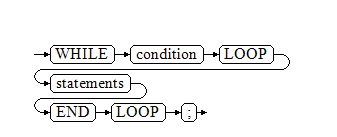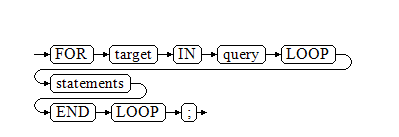Loop Statements¶
Simple LOOP Statements¶
The syntax diagram is as follows.

Figure 1 loop::=¶
Examples
CREATE OR REPLACE PROCEDURE proc_loop(i in integer, count out integer)
AS
BEGIN
count:=0;
LOOP
IF count > i THEN
raise info 'count is %. ', count;
EXIT;
ELSE
count:=count+1;
END IF;
END LOOP;
END;
/
CALL proc_loop(10,5);
Important
The loop must be exploited together with EXIT; otherwise, a dead loop occurs.
WHILE-LOOP Statements¶
The syntax diagram is as follows.

Figure 2 while_loop::=¶
If the conditional expression is true, a series of statements in the WHILE statement are repeatedly executed and the condition is decided each time the loop body is executed.
Examples
CREATE TABLE integertable(c1 integer) DISTRIBUTE BY hash(c1);
CREATE OR REPLACE PROCEDURE proc_while_loop(maxval in integer)
AS
DECLARE
i int :=1;
BEGIN
WHILE i < maxval LOOP
INSERT INTO integertable VALUES(i);
i:=i+1;
END LOOP;
END;
/
-- Invoke a function:
CALL proc_while_loop(10);
-- Delete the stored procedure and table:
DROP PROCEDURE proc_while_loop;
DROP TABLE integertable;
FOR_LOOP (Integer variable) Statement¶
The syntax diagram is as follows.

Figure 3 for_loop::=¶
Note
The variable name is automatically defined as the integer type and exists only in this loop. The variable name falls between lower_bound and upper_bound.
When the keyword REVERSE is used, the lower bound must be greater than or equal to the upper bound; otherwise, the loop body is not executed.
Examples
-- Loop from 0 to 5:
CREATE OR REPLACE PROCEDURE proc_for_loop()
AS
BEGIN
FOR I IN 0..5 LOOP
DBMS_OUTPUT.PUT_LINE('It is '||to_char(I) || ' time;') ;
END LOOP;
END;
/
-- Invoke a function:
CALL proc_for_loop();
-- Delete the stored procedure:
DROP PROCEDURE proc_for_loop;
FOR_LOOP Query Statements¶
The syntax diagram is as follows.

Figure 4 for_loop_query::=¶
Note
The variable target is automatically defined, its type is the same as that in the query result, and it is valid only in this loop. The target value is the query result.
Examples
-- Display the query result from the loop:
CREATE OR REPLACE PROCEDURE proc_for_loop_query()
AS
record VARCHAR2(50);
BEGIN
FOR record IN SELECT spcname FROM pg_tablespace LOOP
dbms_output.put_line(record);
END LOOP;
END;
/
-- Invoke a function.
CALL proc_for_loop_query();
-- Delete the stored procedure.
DROP PROCEDURE proc_for_loop_query;
FORALL Batch Query Statements¶
The syntax diagram is as follows.

Figure 5 forall::=¶
Note
The variable index is automatically defined as the integer type and exists only in this loop. The index value falls between low_bound and upper_bound.
Examples
CREATE TABLE hdfs_t1 (
title NUMBER(6),
did VARCHAR2(20),
data_period VARCHAR2(25),
kind VARCHAR2(25),
interval VARCHAR2(20),
time DATE,
isModified VARCHAR2(10)
)
DISTRIBUTE BY hash(did);
INSERT INTO hdfs_t1 VALUES( 8, 'Donald', 'OConnell', 'DOCONNEL', '650.507.9833', to_date('21-06-1999', 'dd-mm-yyyy'), 'SH_CLERK' );
CREATE OR REPLACE PROCEDURE proc_forall()
AS
BEGIN
FORALL i IN 100..120
insert into hdfs_t1(title) values(i);
END;
/
-- Invoke a function:
CALL proc_forall();
-- Query the invocation result of the stored procedure:
SELECT * FROM hdfs_t1 WHERE title BETWEEN 100 AND 120;
-- Delete the stored procedure and table:
DROP PROCEDURE proc_forall;
DROP TABLE hdfs_t1;